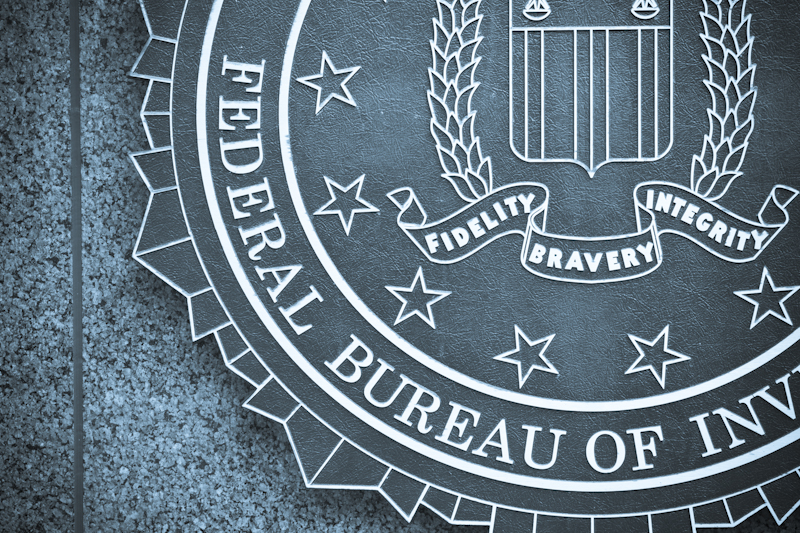Case Summary: Fourth Circuit Upholds Terrorism Watchlist Database
On March 30, the U.S. Court of Appeals for the Fourth Circuit in El-Hady v. Kable upheld the constitutionality of the Terrorism Screening Database (TSDB), a watchlist maintained by the FBI that currently contains the names of more than 1 million “known or suspected terrorists.” With this ruling the Fourth Circuit joins the Sixth and Tenth Circuits, both of which have upheld the constitutionality of such terrorism watchlists in recent years.

Published by The Lawfare Institute
in Cooperation With

Introduction
On March 30, the U.S. Court of Appeals for the Fourth Circuit in El-Hady v. Kable upheld the constitutionality of the Terrorism Screening Database (TSDB), a watchlist maintained by the FBI that currently contains the names of more than 1 million “known or suspected terrorists.” Judge J. Harvie Wilkinson III wrote for a unanimous three-judge panel that the TSDB was constitutional because it fell under the executive branch’s long-standing “authority to regulate travel and control the border.” The titular plaintiff, Anas El-Hady, one of 23 individuals who sued, claimed that inclusion in the TSDB subjected them to delays and other inconveniences while trying to enter the United States at the border or flying commercially within the country. The TSDB is the foundation of the executive branch’s broad program of connected, overlapping terrorist watchlists. With this ruling the Fourth Circuit joins the Sixth and Tenth Circuits, both of which have upheld the constitutionality of such terrorism watchlists in recent years.
The TSDB
As we have written previously for Lawfare, the TSDB is the central terrorist watchlist maintained by the executive branch and serves as the foundation for other, more narrow lists like the No Fly List. The TSDB is maintained by the FBI’s Terrorist Screening Center (TSC); agents and analysts from different federal agencies nominate individuals for inclusion in the TSDB, but those individuals are placed on the list only after the nominations are reviewed and approved by staffers at the TSC and the National Counterterrorism Center (NCTC).
For the TSC to approve an individual’s nomination for inclusion in the TSDB, analysts must confirm that there is “reasonable suspicion to believe that the person is a known or suspected terrorist.” Reasonable suspicion is not an enormously high threshold: The federal officer making the nomination must have “articulable intelligence” and “rational inferences from those facts,” which can include an individual’s “travel history, associates, business associations, international connections, financial transactions, and ethnic or religious affiliations.” As the government explained in this litigation, it has enacted safeguards to ensure the accuracy of the TSDB. Nominating agencies must have procedures that prevent errors in the nominations forwarded by its employees, and the TSC must conduct reviews of all U.S. citizens and permanent residents included on the list. Additionally, Congress has directed the Department of Homeland Security to provide redress options to all travelers who believe they were delayed or prohibited from boarding a flight because they were “wrongly identified as a threat” under Homeland Security programs. However, as a matter of general policy, the government will not disclose an individual’s TSDB status in its response to traveler complaints.
Once individuals are placed in the TSDB, they are eligible to be placed on three subsidiary lists related to commercial flight and entering the country. Though not the subject of this litigation, the most well known of those three is the No Fly List, which prohibits all listed individuals from boarding a commercial aircraft that will enter or fly within U.S. airspace. The plaintiffs in El-Hady did not allege that they were on the No Fly List; rather, they argued that they had been placed on its less severe counterparts: the Selectee and Expanded Selectee lists. Individuals on the Selectee List are allowed to board commercial airplanes traveling to or within the United States, but they must undergo enhanced security screening before doing so. Individuals on the Expanded Selectee List are subject to the same restrictions. The government must provide “additional substantive derogatory criteria” to include individuals on the Selectee List, but not the Expanded Selectee List, though what those criteria entail is unclear. The practical difference between the two lists is that the Expanded Selectee List is invoked only in times of emergency, like in the aftermath of a failed terrorist attack, when the government uses it as a backstop to check travelers whose information matches a name in the entire TSDB, rather than just the No Fly List or Selectee List.
Enhanced screening consists of a search of the individual as well as a physical examination of the traveler’s luggage. As Wilkinson explained, anyone on the Selectee and Expanded Selectee lists must undergo enhanced screening before boarding a commercial airplane, but such measures are not reserved exclusively for people on those lists—anyone randomly pulled aside for extra screening undergoes the same scrutiny.
The Plaintiffs’ Allegations
The plaintiffs in El-Hady alleged that they had been subjected to a range of negative consequences as a result of their claimed inclusion in the TSDB. Some claimed that the enhanced screening at airports had caused them to miss flights or to be embarrassed in front of family members, to the point that one plaintiff allegedly drives on long trips to avoid the ordeal of passing through security checkpoints when flying. A few alleged more extreme consequences that went beyond the typical enhanced scrutiny at airports. Two separately claimed that Customs and Border Protection agents had stopped and handcuffed them at the border before detaining them in frigid rooms for hours at a time. Another said that he had been detained at gunpoint at the border, while yet another stated that federal agents twice seized his phone at the border, where FBI agents attempted to recruit him as an informant. Yet most of the plaintiffs stated that they crossed the border “without unusual delays or incidents a fair percentage of the time.”
Beyond the immediate border scrutiny and detentions, the plaintiffs alleged several longer-term consequences of their inclusion in the TSDB, including lengthy delays in visa applications for themselves and their families, as well as difficulty obtaining jobs in national security-adjacent fields, like at nuclear power plants. They also noted that they had difficulty obtaining firearms licenses, arguing that the difficulty came because the FBI uses the TSDB in conducting routine background checks for such purchases.
The Parties’ Legal Arguments
During discovery, the government did not disclose whether any of the plaintiffs were in fact included in the TSDB, but for purposes of evaluating their claims, the Fourth Circuit assumed that they were listed. On appeal, the plaintiffs raised Fifth Amendment procedural due process claims, alleging that their inclusion in the TSDB had violated liberty interests protected by the Due Process Clause by infringing their right to travel, subjectively deterring them from traveling and causing them reputational harm. The Fourth Circuit rejected the claims, overruling a district court decision that held otherwise.
The Fourth Circuit panel noted that the right to travel has long been protected under the Constitution, specifically the Due Process Clause. However, the right has historically been subject to government regulation, including regulations that burden both domestic and international travel such as security inspections, customs checks and passport requirements. Consequently, explained the panel, the right to travel is a qualified, not an absolute, right. Here, the plaintiffs had not alleged a total ban on their ability to travel or even a total ban on their ability to travel via airline, as none was on the No Fly List. Rather, the plaintiffs had alleged only that because of their inclusion in the TSDB, they had been subjected to enhanced screening procedures at airports that resulted in travel delays. Most of the delays in question were an hour or less, though a few delays took up to three hours and resulted in missed flights. Critically, several of the plaintiffs had flown multiple times domestically and internationally without experiencing any additional security checks or delays while included in the TSDB. The court also noted that most secondary or enhanced security checks at airports are conducted on a random selection of passengers, the vast majority of whom are not in the TSDB. As a result, the burdens on the plaintiffs’ right to travel were not notably greater than those experienced by the typical airline traveler.
The plaintiffs also claimed that they were subjectively deterred from traveling via airline as a result of their inclusion in the TSDB and the resulting inconveniences and humiliation they had experienced when flying. The panel expressed doubt that subjective, as opposed to objective, deterrence implicated due process considerations, as the Supreme Court generally prefers objective standards in constitutional law to avoid having to assess litigants’ sincerity or idiosyncrasies. However, even if the plaintiffs’ allegations of deterrence were credited, the court found it “decisive” that no plaintiff had alleged he could not reach a specific destination because of inclusion in the TSDB. In holding that there is no protected liberty interest in the right to travel via a particular mode of transportation, the Fourth Circuit panel elected to follow the Sixth and Tenth Circuits, which had also declined to recognize such a right in recent cases. The Sixth Circuit in Beydoun v. Sessions and the Tenth Circuit in Abdi v. Wray both rejected plaintiffs’ similar claims of due process violations as a result of their inclusion on the Selectee List. Here, the court found persuasive the Sixth and Tenth Circuits’ analysis focusing on the average travel delay caused by enhanced screening procedures rather than outlier instances—as well as the fact that inclusion on the Selectee List or in the TSDB does not affect plaintiffs’ ability to use other modes of transportation.
Finally, while the Supreme Court has recognized a liberty interest in a person’s reputation, reputational injuries must involve a combination of factors: a statement that stigmatizes the plaintiff in the community and has been publicly disseminated, and the government must take some additional action that has altered or extinguished the plaintiff’s legal rights. The Fourth Circuit panel determined that inclusion in the TSDB had not stigmatized the plaintiffs because that information had not been disseminated publicly. Neither the government’s interagency sharing nor its selective disclosure of names in the TSDB to private companies that work closely on national security issues constitutes public disclosure of the plaintiffs’ inclusion in the database. Moreover, the plaintiffs failed to show that their legal rights had been altered or extinguished as a result of their inclusion in the TSDB. Their right to travel domestically or internationally had not been extinguished, nor had the plaintiffs alleged that their TSDB status interfered with their ability to gain employment, obtain licenses or permits, or purchase firearms.
Implications
The Fourth Circuit’s ruling has several implications for future litigants seeking to challenge their inclusion on terrorism watchlists and bring claims of constitutional violations as a result of their inclusion.
By closely following the decisions and analysis of the Sixth and Tenth Circuits in similar cases, the Fourth Circuit expressly declined to create a circuit split. Consequently, it is unlikely that the Supreme Court will take up due process challenges to the terrorism watchlists any time soon.
However, the Fourth Circuit panel proposed an alternative path forward for future litigants. Facial due process challenges to the terrorism watchlists––in other words, challenges to the constitutionality of the existence of the TSDB––have now failed in three different circuits. The court suggested that plaintiffs might more successfully bring Fourth Amendment challenges against unreasonable searches or seizures in the course of undergoing enhanced security screening. Noting that a few of the plaintiffs had alleged more extreme and potentially violative encounters with law enforcement while traveling, the court explained that an individualized inquiry into whether a particular encounter violated the Fourth Amendment’s reasonableness requirement could prove more fruitful for such plaintiffs.
Finally, the Fourth Circuit did not need to reach the question of whether due process required the Department of Homeland Security to provide additional procedures for those seeking to challenge their inclusion in the TSDB because the court determined that no protected interest had been violated. The panel strongly suggested that it would be unlikely that such additional procedures could be judicially mandated even if a due process violation had been found. When deciding whether due process requires additional procedural safeguards, courts balance the plaintiffs’ interest against the government’s interest and assess the cost to the government of having to provide any additional procedural protections. The panel explained that the government’s interest was “extraordinarily significant,” as the government represented that the TSDB functions as a core part of its counterterrorism efforts and additional procedures could increase the risk of terrorism incidents. In contrast, the court characterized as weak the plaintiffs’ interest in more convenient airline travel. Finally, the court believed it would be inappropriate to second-guess Congress’s assessment of the appropriate procedural safeguards for airline travelers. Congress created the Department of Homeland Security’s Traveler Redress Inquiry Program (TRIP) system as the process of redress for individuals who believe they have been placed on a terrorism watchlist; and in doing so, Congress balanced the risk of innocent people being included in such databases against the risk of terrorism. The court did not believe it would be the judiciary’s prerogative to interfere with that legislative decision.




.png?sfvrsn=48e6afb0_5)

